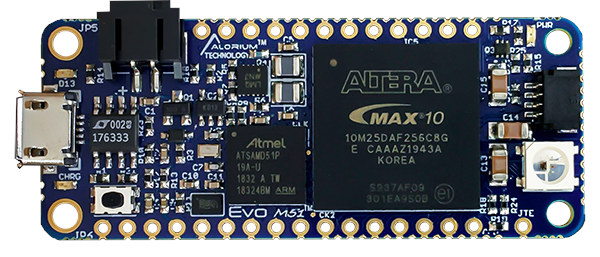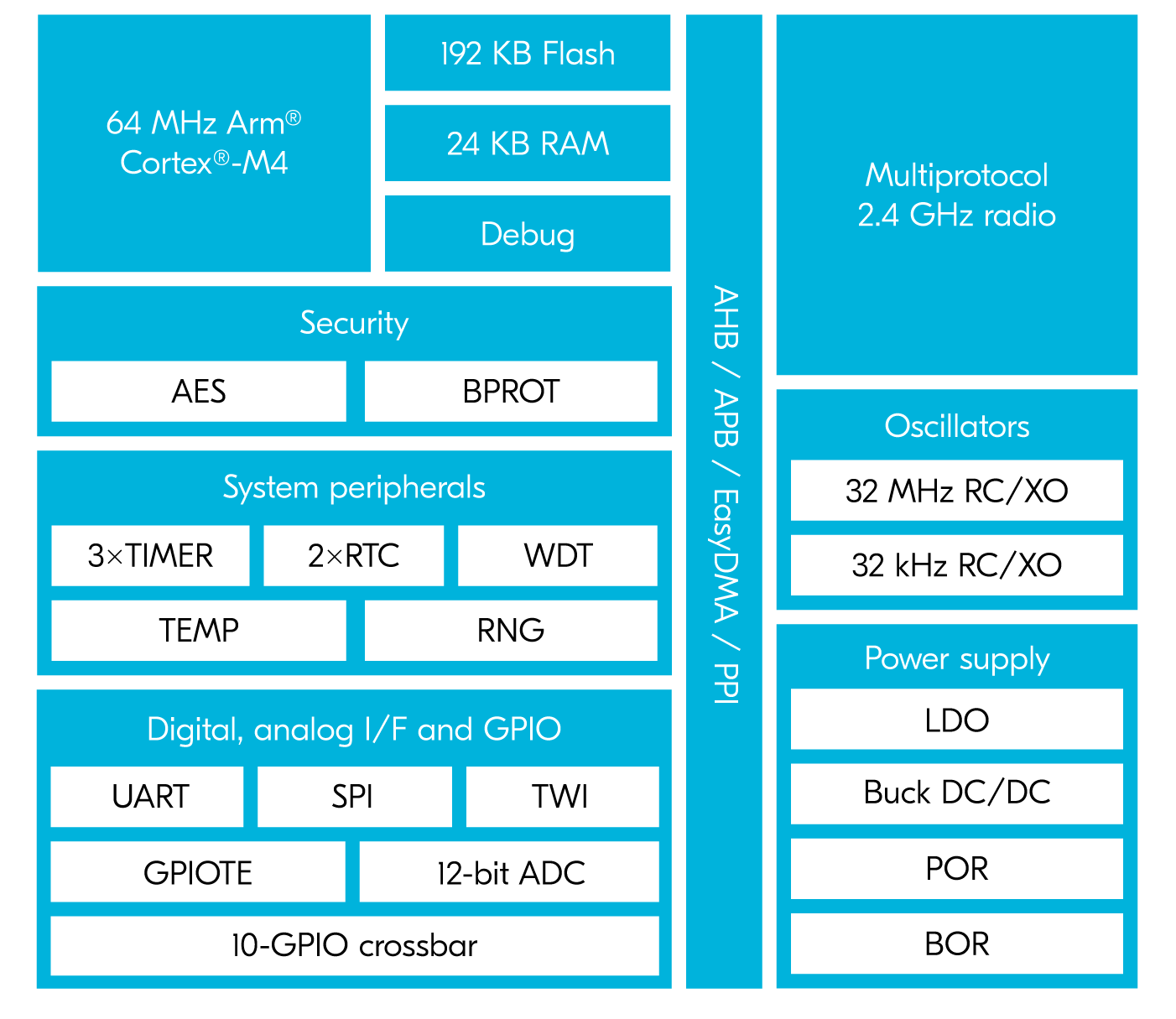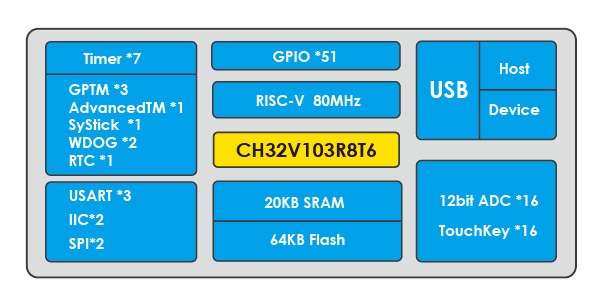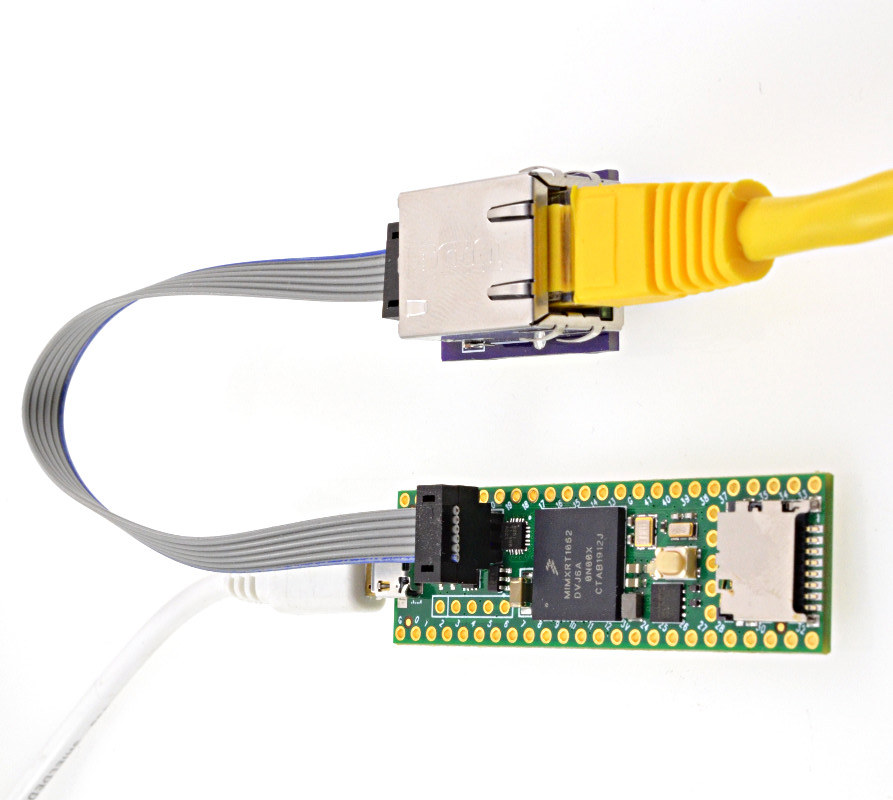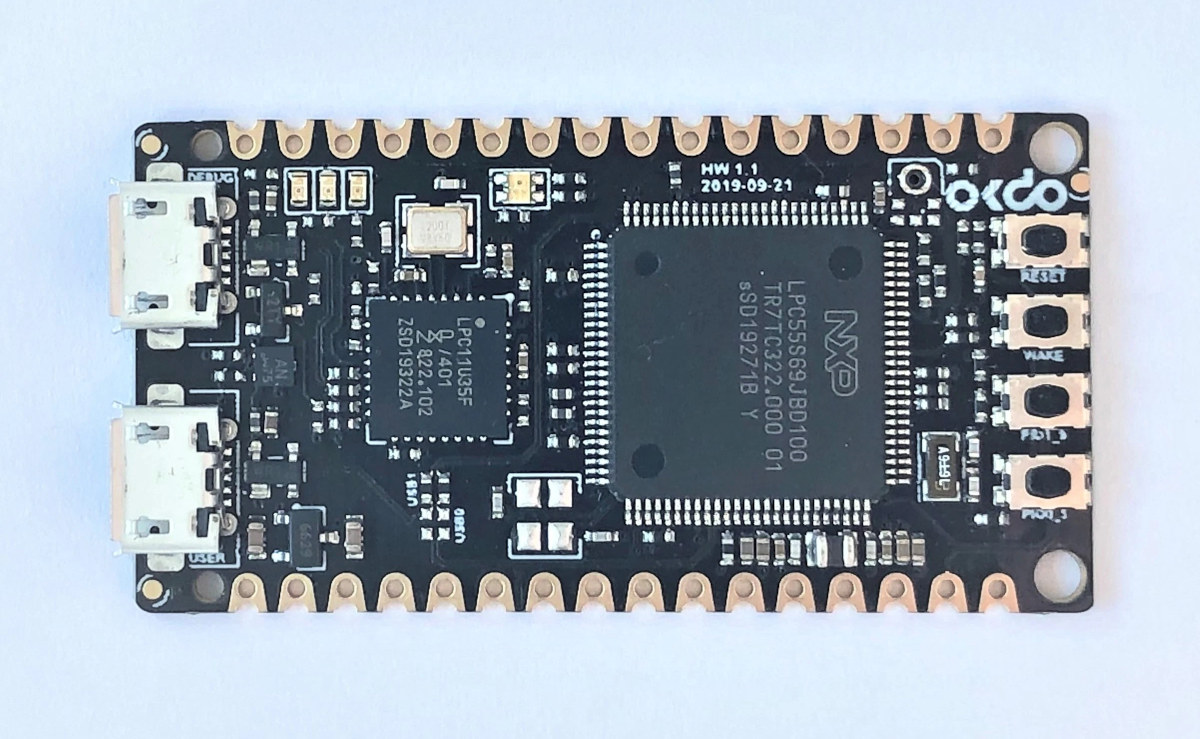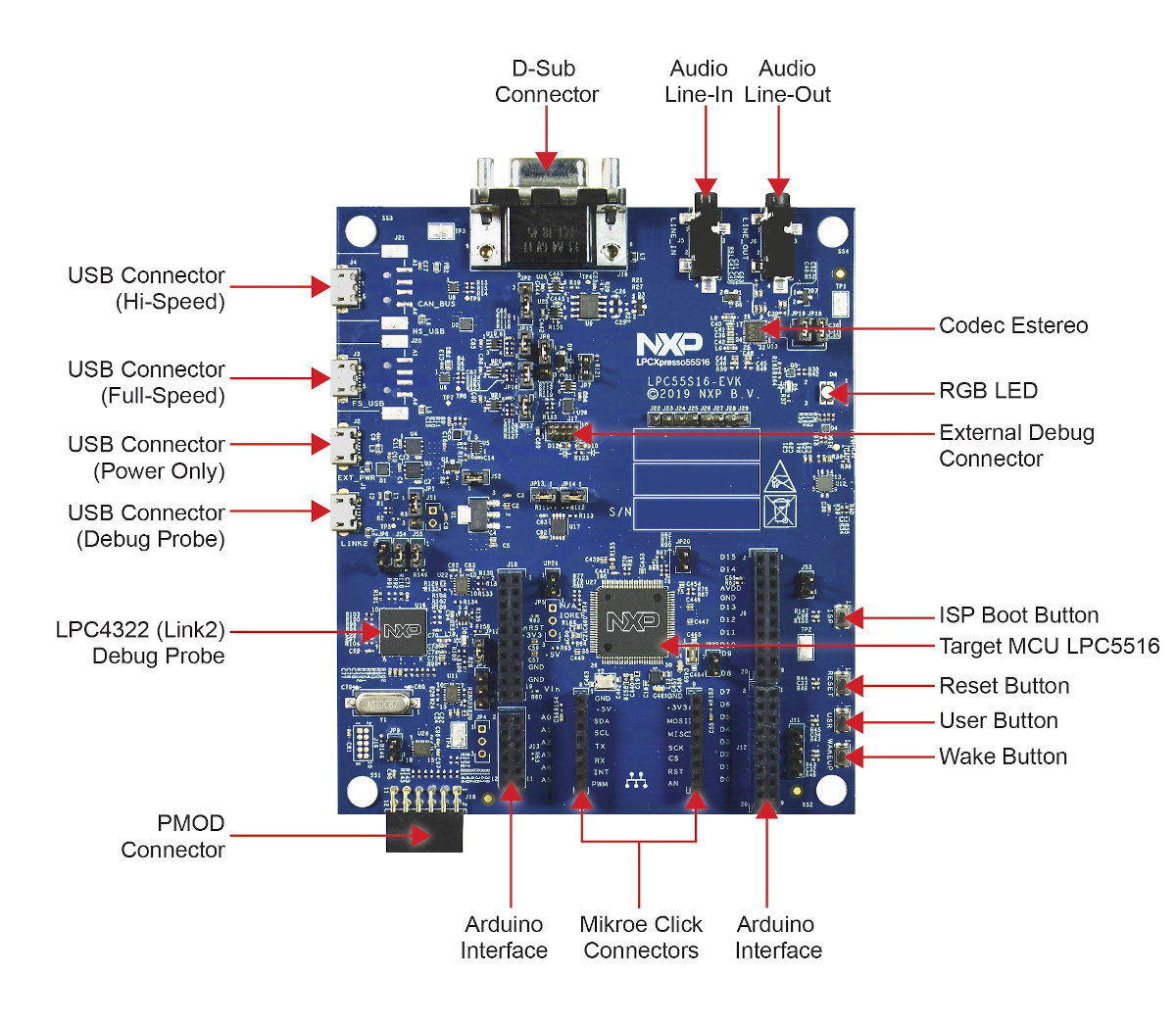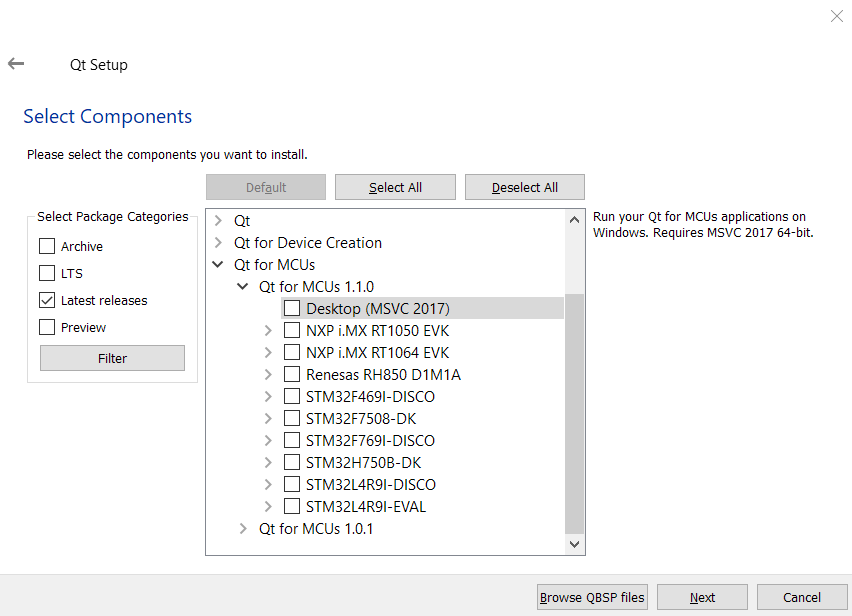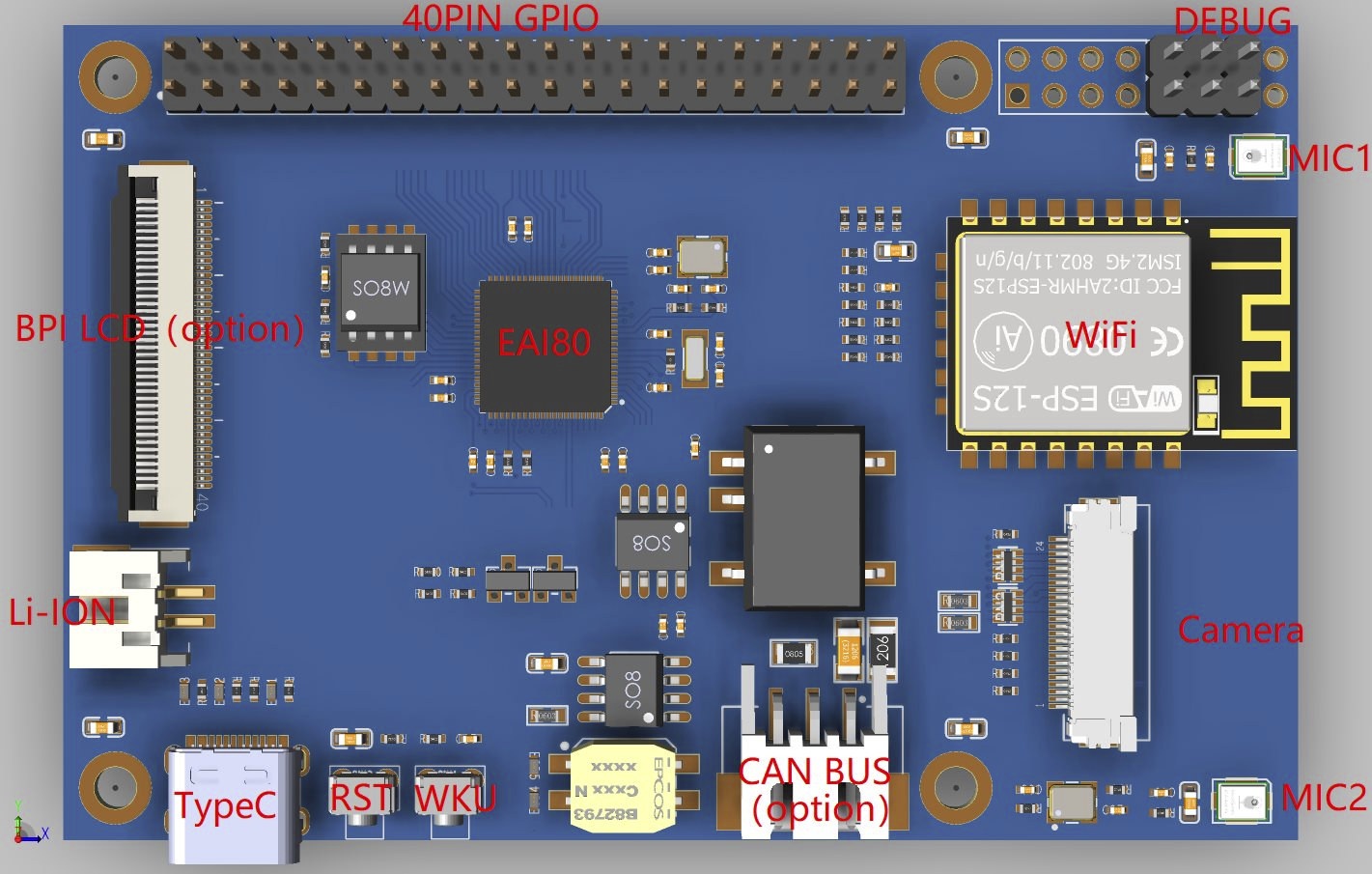Arduino unveiled its first FPGA board around two years ago with MKR Vidor 4000 combining an Intel Cyclone FPGA with Microchip SAMD21 Cortex-M0+ MCU in a form factor similar to Arduino Zero. But in case you are looking for an even smaller Arduino compatible FPGA board, Alorium Technology’s Evo M51 might be exactly what you are after. The Adafruit Feather-sized board is equipped with an Atmel SAMD51 Arm Cortex-M4F microcontroller coupled with an Intel MAX 10 FPGA. Evo M51 specifications: MCU – Microchip (Atmel) SAMD51 Arm Cortex-M4F microcontroller clocked at 120 MHz with 512KB flash, 192 KB SRAM FPGA – Intel MAX 10 (10M25) FPGA with 25K LEs, 675Kbit block memory Storage – 2MB external flash USB – 1x micro USB port for power and programming I/O Digital 55x Total Digital I/O – 21x through-hole/castellated vias, 34x additional castellated-only 6x digital pins shared with analog pins 3.3V Inputs, 3.3V Outputs […]
nRF52805 Tiny Bluetooth 5.2 SoC is Optimized for Small Two-layer PCB Designs
Nordic Semi has just added a new member to its nRF52 Bluetooth 5 wireless SoC family with nRF52805 offered in a tiny WLCSP package measuring 2.48×2.46 mm and optimized for cost-effective 2-layer PCB designs. nRF52805 key features and specifications: MCU Core – Arm Cortex-M4 @ 64 MHz Storage & Memory – 192 KB Flash, 24 KB RAM Wireless Bluetooth Low Energy and 2.4 GHz proprietary protocols. High bitrate – 2 Mbps, 1 Mbps +4 dBm TX power -97 dBm RX sensitivity (1 Mbps Bluetooth LE) Integrated balun with single-ended output I/Os – UART, SPI, TWI, 2-channel 12-bit ADC Security 128-bit AES Power Consumption 7 mA in TX (4 dBm) 4.6 mA in TX (0 dBm) 4.6 mA in RX (1 Mbps) 0.3 μA in System OFF 1.1 μA in System ON with 24 KB RAM retained and RTC running Supply Voltage – 3.6V max Package – 2.48×2.46 mm WLCSP Note […]
WCH CH32V103 General-Purpose RISC-V MCU Offers an Alternative to GD32V RISC-V Microcontroller
Last year, WCH introduced their first RISC-V MCU with CH572 Bluetooth LE microcontroller which came with 10KB SRAM and a not so convenient 96KB OTP flash. But I’ve just been informed the company has introduced their first general-purpose RISC-V MCU family with several CH32V103 microcontrollers featuring up to 64KB Flash and 20KB SRAM, and all sort of peripherals you’d expect from a general-purpose MCU. WCH CH32V103 key features and specifications: CPU Core – 32-bit RISC-V (RV32IMAC) core @ up to 72/80 MHz called ” RISC-V3A” Memory – 10KB or 20KB SRAM Storage – 32KB or 64KB flash Peripherals 1x USB 2.0 Full Speed Host/Device Up to 2x SPI (master/slave), up to 2x I2C, up to 3x USART Up to 16x 12-bit ADC/touch key 37x or 51x GPIOs Up to 3x general-purpose timers, 1x advanced timer, 2x watchdog timers, 1x Systick Supply Voltage – 2.7 to 5.5V Package – LQFP48, QFN48 […]
Teensy 4.1 Board Gets Longer for Ethernet, MicroSD Slot, and More GPIOs
What comes after Teensy 4.0? Teensy 4.1. The new version of the Arduino compatible board is powered by the same NXP i.MX RT1062 Cortex-M7 crossover processor clocked at 600 MHz, but about doubling in length in order to add a 10/100 Mbit Ethernet PHY, a MicroSD card slot, and offer more I/Os. Teensy 4.1 also increases flash memory to 8 MB (vs 2 MB for Teensy 4.0), and the USB hot-plugging power management circuitry needed to plug a USB device via a USB host cable. Teensy 4.1 specifications: SoC – NXP i.MX RT1062 Arm Cortex-M7 processor at 600 MHz with 1024KB RAM (512KB is tightly coupled), Storage – 8 MB serial flash (64KB reserved for recovery & EEPROM emulation), MicroSD Socket, footprints for 2x extra QSPI chips such as flash or 8MB PSRAM chip USB – 1x micro USB port for power and programming Networking – 6-pin Ethernet header via […]
OKdo E1 Arm Development Board Launched with NXP LPC55S69 Cortex-M33 MCU
We’ve just written about the launch of NXP LPC551x/S1x Arm Cortex-M33 MCU family, but OKdo has very recently announced a development board based on the previous generation LPC5500 Cortex-M33 processor, namely OKdo E1 powered by an NXP LPC55S59 dual-core Cortex-M33 processor. OKdo E1 specification: MCU – NXP LPC55S69JBD100 dual-core Arm Cortex-M33 @ up to 150 MHz with 640KB flash, 320 KB SRAM, FPU, Arm TrustZone, CASPER Crypto co-processor, and PowerQuad Hardware Accelerator for fixed and floating-point DSP functions Expansion – 32x through holes and castellated holes with Up to 9x Flexcomm interfaces (SW selectable as USART, SPI, I2C, or I2S interface) GPIOs, I2C, ADC, UART, SPI, etc… USB – 1x Micro USB 2.0 “User” port, 1x Micro USB 2.0 port for debug and power Debugging In-built CMSIS-DAP v1.0.7 debugger based on LPC11U35 Micro USB port with UART over USB virtual COM port Clocks – Internal PLL support up to 100MHz […]
NXP LPC551x/S1x Arm Cortex-M33 MCU Family Launched with LPC55S16 Development Board
NXP has announced the general availability of LPC551x/S1x Arm Cortex-M33 MCU family with low power consumption, embedded security, pin-, software- and peripheral-compatibility. The LPC551x/S1x family is manufactured using a cost-effective 40-nm NVM process technology and targets industrial and general embedded markets. An LPC55S16 based development board – PLC55S16-EVK – is also offered for evaluation and software development. NXP LPC551x/S1x MCU Key features and specifications: CPU – Arm Cortex-M33 core @ up to 150 MHz delivering over 600 EEMBC CoreMarks and consuming as low as 32uA/MHz Memory and Storage – Up to 256 KB on-chip flash; up to 96 KB SRAM; 128 KB boot ROM Peripherals CAN FD / CAN 2.0 Dual-USB with on-chip PHY, supporting both HS and FS modes SDIO and up to 9 FlexComm interfaces (configurable as either SPI/I2C/I2S, UART) Up to 64x GPIO pins 16-bit ADC with five differential channel pair Comparator with five input pins and […]
Qt for MCUs 1.1 Adds Support for more STM32 and NXP i.MX RT Boards, FreeRTOS
The first stable version of Qt for MCUs was released in August 2019 in order to bring Qt graphical toolkit to microcontrollers such as STMicro STM32F7, Renesas RH850, or NXP i.MX RT1050. Qt for MCUs would run bare metal on supported boards, and software engineers would develop graphical interface using QML and C++. Qt for MCUs 1.1 has just been released with the addition of more STM32 and i.MX RT boards, support for FreeRTOS real-time operating system, and more. Qt for MCUs 1.1 highlights: Five new supported boards: NXP i.MX RT 1064 EVK, STM32 H750B-DK, STM32 F469i-disco, STM32 L4R9i-disco, and STM32 L4R9i-eval Asset management Optional PNG compressions for assets to lower storage footprint Option to read data directly from flash memory for lower RAM consumption, or copy to RAM for better performance, at the cost of higher RAM consumption. FreeRTOS support (technology preview) to run background tasks without blocking the […]
Edgeless EAI-Series Dual Arm Cortex-M4 MCU Features a 300 GOPS CNN-NPU
Microcontrollers will have an important role to play in AIoT (AI + IoT) applications as they provide the lowest cost and power consumption. Performance is limited but we start seeing MCUs with AI accelerators such as GreenWaves GAP9 multi-core RISC-V microcontroller or Kendryte K210 RISC-V MCU with a KPU AI accelerator. Another option is by Edgeless Semiconductor Co. Ltd (零边界集成电路有限公司) based in Zhuhai, China, and more specifically its Edgeless EAI-Series dual-core Arm Cortex-M4 microcontrollers equipped with a 300 GOPS CNN NPU. Edgeless EAI specifications: CPU – Dual Arm Cortex-M4F @ up to 200Mhz, with DSP instructions, I/D cache for high performance; 500DMIPS/1.25DMIPS/MHz (Dhrystone2.1) AI Accelerator – CNN-NPU clocked at up to 300MHz with 300 GOPS peak throughput; 144MAC/cycle, EER up to 1TOPS/W, for image recognition scenario. Support major CNN Models including Resnet-18, Resnet-34, Vgg16, GoogleNet, Lenet, etc.. Support Convolutional kernel size 1~7 Support Channel/Feature No. up to 512 Support Max/Average […]


